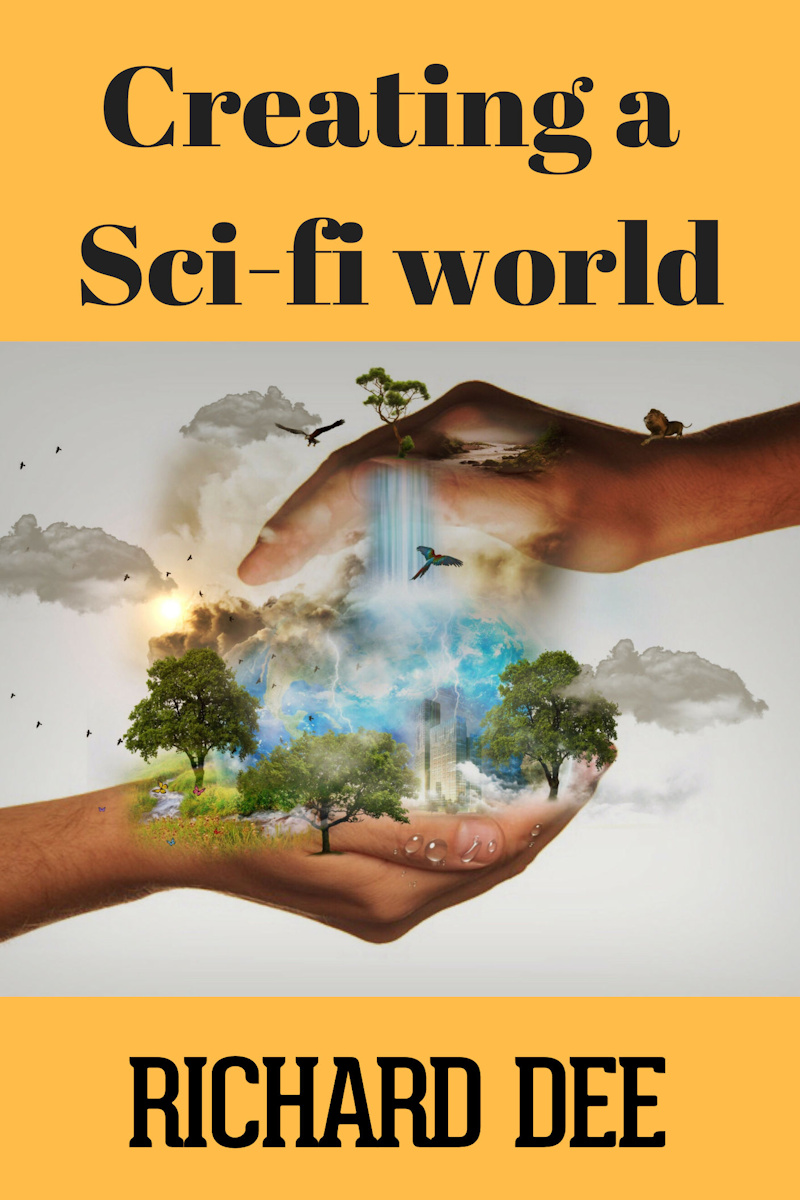Today I’d like to welcome Richard to the blog. Richard is an author and he teaches workshops on world building, so who better to ask for some top tips on world building for your novel? That’s it from me today, I’m handing you over to Richard.

Hi everybody and thank you to Debbie for inviting me to be a guest on her website.
Let me introduce myself, I’m Richard Dee and I write Science Fiction and Steampunk adventures. I also chronicle the exploits of Andorra Pett, a reluctant amateur detective.

I’ve published 12 novels and several short stories and I’ve always striven to create futuristic (and alternative) worlds that are realistic and based on what we have today; extrapolated to a possible future.
I must admit that I find the whole idea of creating a world fascinating. Sometimes even more so than writing the action that takes place in it.
In doing that, I’ve come to see common principles that can be applied to world-building. I teach occasional workshops in the subject and have compiled my ideas into a textbook called Creating a Sci-fi World, although my ideas work for any sort of fiction. That, rather than a simple “buy my book” sort of post is what I’d like to talk to you about today.

World Building: Technology
I read a lot of Sci-fi, one thing that I like to see in the world of the future is a resemblance to the world of today. No matter how far into the future we go, I think that if you can see a logical progression from what we have now to what they have then, it makes the whole world more believable and helps you (as a reader) to relate to it.
Which is not to say that you can’t have a quantum leap and end up with light-sabres or time machines or anything that is so far from what we are capable of imagining in your world; just that every world needs a basis in familiarity.
I’ve spoken to lots of people at events and one of the most popular questions they ask me is how I think up all the futuristic technology. I tell them that for 90% of the time, you don’t have to.
It might surprise you to learn that we already possess more than enough technology to survive on an alien planet. All we need is somewhere to go and a means to take it (and us) there. If you think about it for a moment, we can survive in pressurised containers for long periods, in places where we should not be able to live. Submarines can stay submerged for months, aircraft fly where there is not enough oxygen to breathe. We can grow food without soil, recycle our wastes and so much more.
What this means for the writer is that there is no need to invent everything, you can just use what we already have, the familiar things that your reader will feel comfortable with. You can give them a gloss and make them better but underneath they are as ordinary as they are in our lives. And if your clever, you can use their good and bad points to enhance your storytelling, giving you the best of both worlds.
World Building: Structures
Without telling you everything that’s in my textbook, let me give you an example of basic world-building. And how to make it part of the story.
Suppose we need a structure to live in; lets put it on an airless planet. It’s not so difficult to build, it’s really just a see-through yurt with airtight joints. Obviously, it needs to be large enough to fit in everything you need for your colony, and strong enough to protect you from danger.
That introduces a potential problem. It will be heavy, how do you support it?
The answer, which may surprise you, is that you don’t need to, science does it for you. The pressure of the atmosphere inside it will hold it up, much like the water in a canal holds the banks up.
The clever thing is not knowing that but in the way that you use the knowledge. You can make it part of the story. All you need to do is explain the principles to your readers in a conversation between characters. Not only that, you can introduce tension with it. Make your reader aware of its limitations. Suppose the structure has leaks. Air will need to be pumped in faster than it leaks out.
BUT, pump in too much and the structure will explode, too little and it will collapse. So you have to keep friendly with the supplier of air, upset him and you’re in trouble. Not only that, someone has to keep watch to make sure that everything stays within safe limits. Any obvious leaks need to be spotted and mended.
Suddenly, the air, how it arrives, the maintenance of the structure itself, are all important parts of your story.
World Building: Non Futuristic Settings
Or take my Steampunk world. Based on England in the time of Queen Victoria, it’s a world without oil or electricity. I took a starting point before either of these things were in use and advanced from there. You might think that a world like that would have no modern technology, the opposite is true. Jet engines will work perfectly well fuelled by coal gas, mechanical calculators enable complex mathematics, steam and clockwork can drive machinery. In fact, it’s perfectly reasonable to develop these to a point far in advance of what they are capable of in our world.
And, in the absence of oil and electricity, what other discoveries might be made? Could science have advanced in different directions? There is no limit.
That’s just a small taster from the book. I go into a lot more detail about the major (and minor) aspects of world building inside it. There are also chapters on plotting, suggestions about the use and invention of technology, sidekicks and much more. I’ve included exercises and samples from my novels, plus a couple of short stories to illustrate the points.
If that’s got you interested in world building and you’d like to know take a look here.

If you want to learn more about my worlds, you can find me at richarddeescifi.co.uk.
Head over there to see what I get up to. You’ll find free short stories, regular features on writing, book reviews and guest appearances from other great authors. Click the FREE STUFF tab or the PORTFOLIO tab to get all the details about my work or join my newsletter to get a free short story.
I’m on Facebook at RichardDeeAuthor and Twitter at Richard Dee Sci-Fi

Fascinating read – so much i need to learn
Thanks for hosting me.
You’re welcome